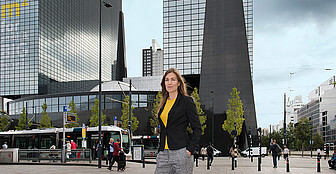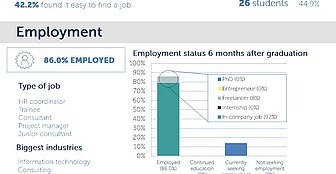
This website uses functional cookies, including analytical cookies. The obtained statistical data cannot be traced back to individual users. Additionally, you can choose to accept or refuse consent to use marketing cookies. If you decline these additional cookies or refrain from making a choice, only functional cookies will be set. See our cookie policy for more information.
Blog: Thursday, 19 June 2020
The rise of the Black Lives Matter movement has had a major impact not only in the United States, but also in various countries in Europe including the Netherlands. While the energy that has been released has mostly but not solely encouraged young people to take to the streets, a role that Dynamics of Inclusive Prosperity can take up here is one of thinking in terms of long-term strategies and practical actions to reduce discrimination. In this opinion article Martin de Jong highlights the importance of holding on to nuanced exchange of opinion even in hard times and presenting all ethnic groups to a great variety of role models.
In the higher classes of primary school, most boys have their fair share of brawls and skirmishes. I was no exception when I was small in the late 1970s and early 1980s. Most of the time I had to face these fights on my own, but I vividly remember at least one time somebody boldly came to my aid exclaiming: ‘You will not touch my friend Martin!’ It was Rudi, a light-brown son of a Dutch mother and Surinamese father, one year younger than me but apparently stronger and more courageous. He had a slightly darker brother of my age who was an egghead at school, like me. When I met Rudi again years later during a school reunion and told him how great he had been to me, he did not even seem to remember his intervention in my favor and laughed my gratitude away in an off-handish manner. The fact that he was ‘black’ did not seem of any pertinence to me when I was small, even though our school was mostly white. I am not sure how aware Rudi and his brother had been of their ‘special position’, nor if they would have liked others to pay attention to that status or not. Sometimes it can be good if things pass unnoticed. Times have changed. When my children come home from their ‘superdiverse’ school these days, they have seen the greatest possible variety of colors, but approximately only as many ‘white’ children there as there had been ‘black’ ones in my class.

It was against this colorful background that the outbreak of the ‘Black Lives Matter’ demonstrations landed a bit raw on me. There are many more colors in the world than black and white, are there not? It was indeed shameful that once again an African American victim died of police abuse in those hopeless United States, but why was that reason enough to set Europe on fire, I thought to myself. Why should we allow it to destabilize the already fragile social harmony here with the first wave of the COVID-19 epidemic barely over? I was worried to see a very polarized American discourse on race spilling over to Europe which had a markedly different ethnic composition and socio-economic constellation. But from conversations it soon became apparent that most young ‘blacks’ and some young ‘whites’ were serious and relentless about their anger. Racism must forever disappear and the police drastically reformed, everywhere in the world. It seemed that the time for nuance was not now.
This lack of nuance soon proved in American Facebook videos such as that made by Candace Owens, a proclaimed ‘black opponent’ of the Democratic Party. She publicly denounced George Floyd as a recidivist criminal whose heroization was illustrative of the general attitude among ‘blacks’. They followed the wrong role models and blamed whites for their own mishaps and misdemeanors. If they were responsible for such an overwhelming proportion of violence and crime in America, why should only the police change? This lasting attitude of African American victimhood was bound to lead the community nowhere. Many of her points were valid but glossed over the systemic disadvantages experienced by communities of color in taking steps up the societal ladder. A number of white university professors in the United States expressed similar opinions anonymously, fearing they may be publicly grilled or even fired by their employers. The discomfort and lack of tolerance even resonated as far as the Far East, where in a short video circulated with Chinese subtitles recorded in an undisclosed region of the United States, a woman behind a camera provoked silent and disciplined police officers lined up, black and white, by asking them how often they had been to prostitutes, how much they had enjoyed molesting them and how much she loved to hate cops. All policemen in question showed remarkable restraint and one could only admire their dignity. Was this an acceptable display of ‘black anger’ given the circumstances or simply an abject attempt at humiliation of necessary keepers of law and order? Are policemen not simply human beings like us deserving everybody’s respect as long as they disapprove of racist violations and atrocities too? Who on earth made such a video and had an interest in making such an image of the ‘United Slaves of America’ go viral around the world?
It was in this delicate social climate that I was asked by some people, ‘Mr Inclusive Prosperity, should you not be writing something about this topic? How relevant are you in your current role if you remain aloof of these events?’ Others, knowing of my reluctance to get engaged in this topic because of its potential explosiveness, warned me not to do it. Initially I tended towards the latter position, but eventually the balance tipped to the former. I felt it was time to try and bring some nuance back to the discussion and to look beyond activist standpoints into practical action. Realizing that after a period of confrontation between two sides, reconciliation and problem-solving would hopefully come our way, I resolved to examine what the experience of successful ‘black people’ had been on their way up and perhaps draw lessons from that. I picked up the phone and agreed on conversations with two Surinamese-Dutch friends of mine to find how ‘black’ they had felt during their career path. My interest was not to get a representative sample, but rather their in-depth perspective of the mechanisms at play in their interaction with the white environment around them. Moreover, how did they see the stories of an abusive and discriminatory police in Europe?
Neither of them enjoyed the denomination ‘black’. One had spent all of his life avoiding being boxed in as anything at all, the other had explicitly chosen to liberate himself from the strong ties of his cultural community and had chosen success, which required active participation in predominantly white communities. In both cases, this had led them to make distinct career progress, and the immersion in the broader white society had made them develop a good number of friendships with non-black people. These had been very deliberate choices on their part and had just as much to do with reservations they had towards the communities they came from as with a need to adapt to the specific white ways of a predominantly white society before they could reach high. But the news was not all good. The chimera of being stopped and foiled by overassertive men suddenly jumping out of police cars for no obvious reason rang very familiar to them. So did the delays incurred at airports and border crossings when they had their luggage checked endlessly while safe white couples had no worries whatsoever. And this seemed to be true wherever they went in Europe. Was it really a coincidence each time? Were they just being paranoid or were they subject to systematic racism? Eventually they had felt compelled to accept the conclusion it indeed had to be persistent and lasting discrimination which would not go away over time. They somehow had to learn to deal with it and accept it as a fact of life. The same applied to not getting access to certain rewarding or high-level jobs. Nobody questioned whether they were good at their job, but very often the position available at that moment was just a little bit too elevated for them. They were definitely good, just not that good. In the end, they developed the same conviction in this regard: the existence of a glass ceiling for people of color is undeniable. But is this because there are established white-old-boys networks kicking each other the ball and refusing outsiders, or are their own capabilities willy-nilly underrated because they are not white? They were strong and determined, however, and held on until they arrived where they wanted to. We need little imagination to conceive what occurs with individuals who demonstrate less persistence, suffer from lower self-esteem, lack in motivation or have lower educational qualifications: they may end up disappointed, apathetic or even profoundly frustrated. And, as one of them pointed out, since at the times of manumission of blacks in the Americas, in contradistinction to other races and peoples in the West Indies they never received any properties to start their new lives with: new beginnings for them truly started from rock bottom. Slavery has consequently never been far from the minds of their offspring, then as now. Following anybody’s plea, including my own, to look ahead rather than back is simply easier said than done.
My friends both had generally positive feelings about the ‘Black Lives Matter’ demonstrations and their possible long-term impact. This gave them hope that awareness of discrimination may become more pervasive than it has been thus far. In fact, what they had seen in terms of police violence in countless videos was outrageous. And who had already forgotten about the racist choirs in football stadiums? Enough is enough.
And yet, both also had concerns about long-term impact. What if the sharper divide between black and white would lead to this being the common-speak and artificial application of American-born concepts to different European realities? What if this led to more stereotyping and more frequent ‘boxing in’, exactly the phenomenon they had been keen to escape from all their lives? Reform in some police corps towards softer approaches, the reconsideration of the use of certain weapons, trainings to ban racial profiling and, according to some, limited use of affirmative action, may help further progress. But at the end of the day racism can never be eliminated by decree.
One of my friends asked me outright: ‘Do you know any black leaders? Where are they? Are they not noticed or are they not there?’ I had a hard time responding, and later asked the other friend that same question. ‘Yes, there is one: Eric Kuisch is Surinamese-Dutch and he was CTO of Vodafone Germany until very recently. Quite a position! But do you see him in the media? What we get to see is gangsters, rappers, street dancers and football players. We need other role models. Not artificially pushed or imposed ones, but organically evolved ones that are subsequently cherished and replicated’.
Massive following of such role models pushed by the media works in both directions: there is a good possibility that people of color come to see them as examples to be followed, and this is reflected in popular culture. But one may also wonder how members of the white elite react to people like that ringing their doorbell and appearing at their office desk. They are strong and overwhelming, they can run. But can they write a good business report? What will happen if I let them take over the leadership in my corporation? For serious equality, role models need to be far more variegated than they are now. Who will be the successor of generally applauded black TV host Humberto Tan, Holland’s best dressed man? Who saw white Dafne Schippers, world class sprinter coming? What will it take to make such cases normal rather than exceptional? If some insist on getting rid of Zwarte Piet and others cannot live without Sinterklaas, would it not be better if we put spokespersons of both groups around one table, let them gracefully clarify their views to the other side and create a new synthesis for 5 December with new role models that do justice to the core interests of both groups? There are many colors and many shapes to choose from and in whichever ones we raise our children, they are unlikely to complain as long as there is a party in the evening. Imagine the symbolic significance having constructively resolved this problematique!
Our media are shortsighted and sensationalist: they reiterate and reinforce existing images and stereotypes which we blindly follow. What they and we should do instead is put variety on display. Making sharp distinctions between black and white will seriously increase the risk of stereotyping and be counterproductive to mutual integration. It is in the nature of humans as biological creatures to differentiate, perhaps even discriminate; this is a natural consequence of natural selection and a short-hand to making quick decisions in times of turmoil to survive and generate offspring. But not all situations in the modern times require speedy unreflective action. Some issues are simply too important to leave to our lower instincts.
Would it not be nice if things got a little blurrier and multicolored? The world is still an eternally surprising place; we are just preventing ourselves from observing this properly. Nobody wishes to be othered. For a stable and inclusive society where everybody gets the chances they deserve, a white versus black polarization is not helpful. We have the full gamut of brown, grey and other shades. In the end, we really are all one and this is more than just a superficial slogan.
Do not think white. Do not think black. No fight. No flight.
Now relax. Sit back in your chair. Control your respiration.
Feel yourself grow as you breathe in and out.
In…
Out…
In…
Out…
In…
Out…
What is the color of your heart?

Prof. dr. W.M. (Martin) de Jong is Scientific Director of the Erasmus Initiative 'Dynamics of Inclusive Prosperity', one of Erasmus University Rotterdam (EUR) flagship research initiatives. It was jointly established by Erasmus School of Law (ESL), Rotterdam School of Management (RSM) and Erasmus School of Philosophy (ESPhil) and aims to gain knowledge on the inclusion of weak or less-well represented stakeholders in governance and management. It also has an agenda setting role in the broader societal and political debate on this topic.
Along with the above position he is professor at both ESL and RSM (each for 50% of his time) and has a part-time professor position at the School of International Relations and Public Affairs (SIRPA) of Fudan University in Shanghai. Given his 25 year international experience in research, education and entrepreneurship on public policy, decision making, urban studies, infrastructure development and cross-cultural management, it is his goal to make the initiative both locally relevant through knowledge dissemination in the Randstad Area and to give it strong global exposure by establishing partnerships in a number of leading universities around the world.
Martin de Jong (born 1970 in Vlaardingen, married, three children) has obtained his master’s degree in Public Administration from Erasmus University Rotterdam and Leiden University (joint degree) in 1993. He obtained his PhD degree in Systems Engineering and Policy Analysis from Delft University of Technology in 1999. He spent 25 years of his working life at the Faculty of Technology, Policy and Management of Delft University of Technology and climbed the ranks there from PhD student to Antoni van Leeuwenhoek research professor in ‘urban and infrastructure development in China’. In this period he has also worked or been a visiting scholar at University of Amsterdam, George Mason University, Aalto University, Harbin Institute of Technology and Dalian University of Technology. He has been an advisor to the Second Chamber of Dutch Parliament, the Dutch Ministry of Infrastructure and the Environment, the Dutch national gas enterprise, Eurocities, the Nordic Road Federation, the Finnish Ministry of Transport and Communication, the Chinese cities of Shenzhen (Guangdong province) and Jingmen (Hubei province) and a host of other organisations.
During his career, Martin de Jong has specialized in the following topics: policy and governance, planning and decision-making in China, transport infrastructures, sustainable urban development, city branding, Corporate Social Responsibility and cross-cultural management.



















Science Communication and Media Officer
Rotterdam School of Management, Erasmus University (RSM) is one of Europe’s top-ranked business schools. RSM provides ground-breaking research and education furthering excellence in all aspects of management and is based in the international port city of Rotterdam – a vital nexus of business, logistics and trade. RSM’s primary focus is on developing business leaders with international careers who can become a force for positive change by carrying their innovative mindset into a sustainable future. Our first-class range of bachelor, master, MBA, PhD and executive programmes encourage them to become to become critical, creative, caring and collaborative thinkers and doers.
